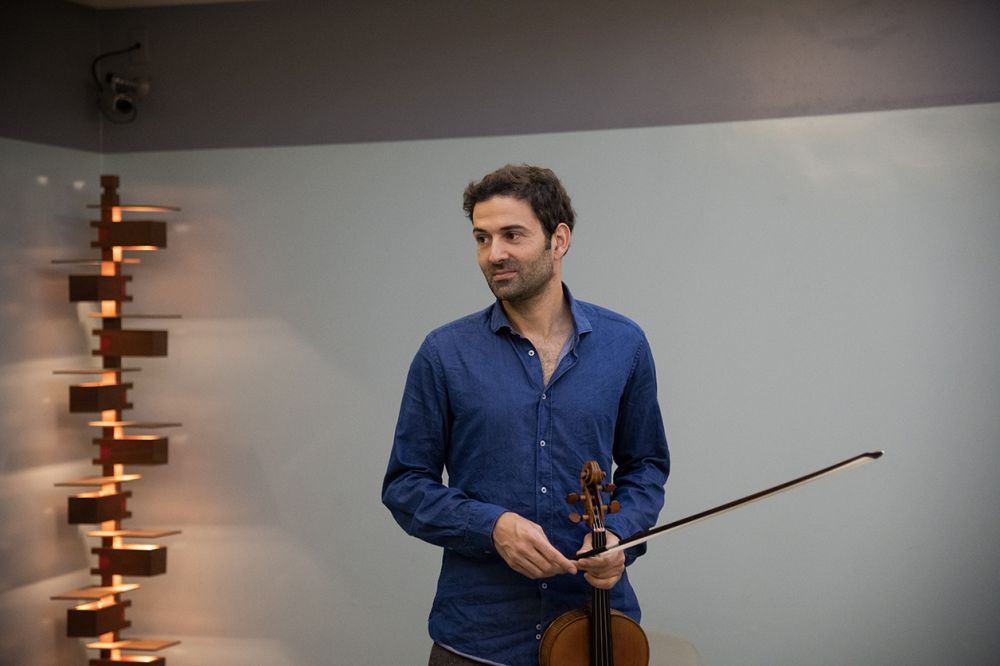

Born in 1979 in Freiburg, Germany, Micha Afkham plays the viola in the Berlin philharmonic and in the Scharoun Ensemble. Though music is his canal of expression, he cultivates many other interests such as gardening, photography and architecture. He has precise ideas of how things should look and be built. Micha Afkham also displays a strong sensibility to moral issues. Justice matters to him. “I can’t stand lies, I have this constant urge for truth.” Simultaneously grounded and in the moon, he reminds me sometimes of Candide. A lucide Candide. One for whom appearances, make-beliefs, bluffs, manipulations remain alien. The afternoon we met, he offered me a barrel of freshly picked potatoes from his garden. He and his partner, French violinist Maïlis Bonnefous, had recently explored the potential fertility of the land in front of their house, ending with twenty times the amount of potatoes expected. I accepted the earthy present and we shared a cup of tea in the living room.
***
Can you tell when you have played well?
Generally, the more critical I am of myself after a performance, the better I played. When I come out confident, chances are I didn’t play that well.
Where does your musical heritage come from?
From my mother. Her father, my grand-father, was a war prisoner among the Russians in Siberia. He would sing for the officers and that’s how he survived. My mother admired him a lot and I suppose that’s where her love for music comes from in part. When we were still small children, she brought musical teachers to our home. That’s how my siblings and I started playing music. It’s only when we all finally left home that she started taking music classes herself. Since then, she sings in cabarets and I must say she is pretty talented.
Did your father have an aesthetic influence on your upbringing?
Absolutely. Though its’ difficult to define through words. It’s something mystical. A way of communicating in which everything isn’t necessarily outspoken, named or quantified. My father was born in 1938 in Iran. He was raised in a Parses community in India before landing in Germany shortly after the Second World War. His roots are therefore quite eclectic, yet strong. There is an aspect of my personality and understanding of reality which is quite foreign to western societies and which comes from my father. A way of communicating with the world, which is more poetic than rational if this makes any sense?
How did you come to play the viola?
I first started playing the piano and the violin. I had a very passionate Romanian teacher who would also organise student string quartets. When I was about twelve, he asked me if I would play the viola in his quartet. I didn’t want to. I wanted to remain first and play the first violin. Shortly after a beautiful viola was lent to me. By curiosity, I tried it and that was it. I was hooked.
Love at first sight?
Absolutely. The viola is five tones lower than the violin. Its sound is deeper, darker more profound than the violin. I experienced this instrumental depth as a liberation. I didn’t have the same connection with the violin. In fact, when I was playing the violin, I wasn’t even sure I wanted to make a career in music. Playing the viola changed my relationship with the orchestra and lent me a purpose that the violin couldn’t. As the first violin, you need to lead. With the viola, you can interact and communicate with the others in the orchestra. You are responsible for the middle voices and that is precisely where I belong.
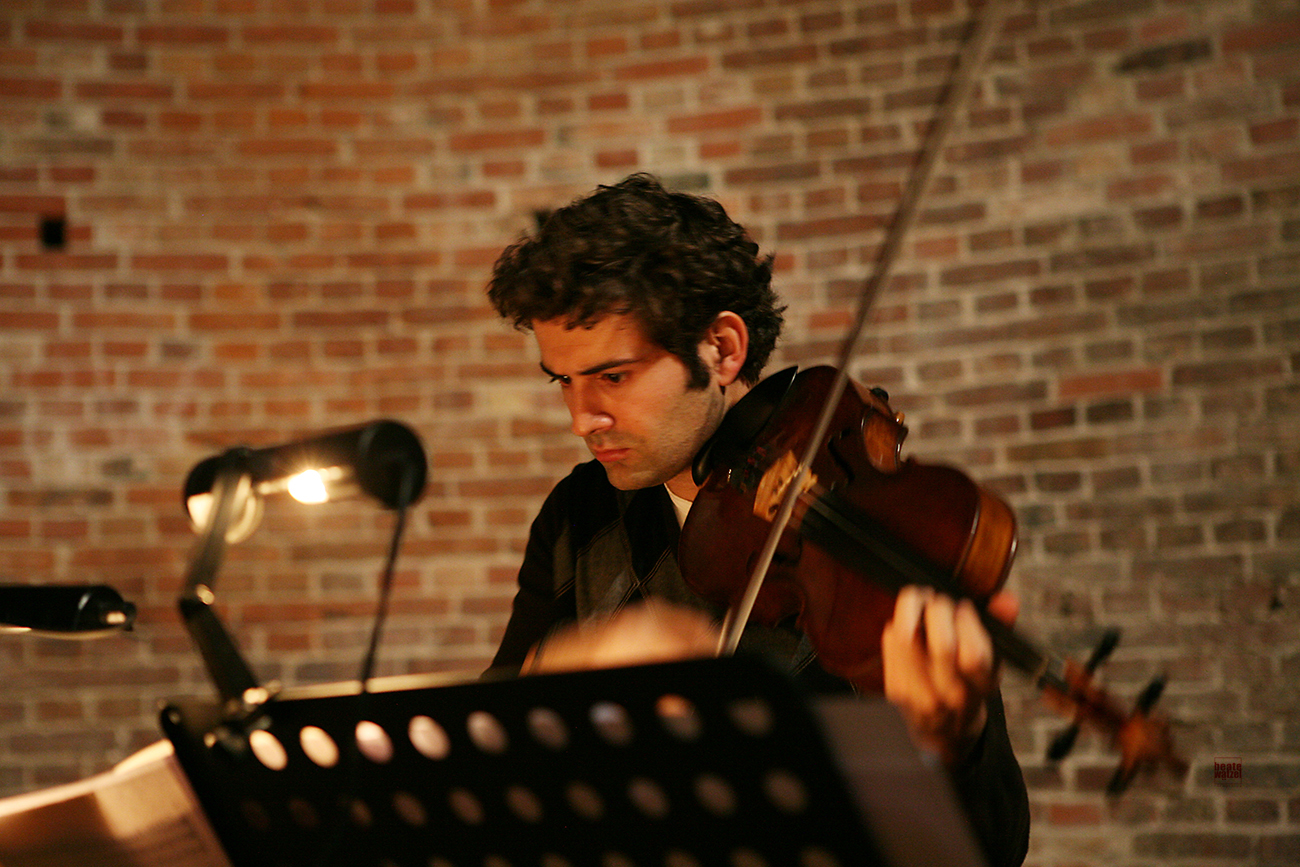 © Beate Wätzel
© Beate Wätzel
Did you have other aspirations than to become a musician?
When I was a child, I’d spend hours lying on the floor in the living room listening to vinyls. I’d listen to the Berlin Philharmonic records with Herbert Karajan over and over. There was also some Queen but my attention was mostly drawn to the Berlin Philharmonic records. I’d listen to them while manipulating the sound basses and observing the differences. I’m aware it’s extremely kitsch what I’m telling you now, but the Berlin Philharmonic has been a childhood dream of mine. A dream I may have buried while I was playing the violin and didn’t know what I wanted to do with my life, but which reemerged as soon as I discovered the viola.
You passed your Abitur in Freiburg while studying in parallel at the Basel music conservatory. A pretty charged adolescence?
Yes, I was constantly going back and forth. First to Mannheim where I would study violin, then to Basel where I switched to viola. I didn’t mind and enjoyed travelling alone in the train. I would eat falafels during the journey, I loved it. After my Abitur, I continued my studies in Basel and that’s when my father realized that I was seriously aiming to become a musician. He did everything he could to dissuade me from it. I remember him once hiding the car keys to prevent me from going to my classes. One needs to understand that in the Persian tradition, the eldest son inherits the father’s status. My father wished for me to have a more respected profession. Strangely, his lack of support benefited me. It resulted in a sort of negative motivation, where I was stimulated even more to follow my own path.
An urge to defy the Father's authority?
Maybe, but when I entered the Berlin Philharmonic it was my father who cried. I mean we both cried together and the weight which had separated us for several years evaporated on the spot.
Before you joined the Berlin Philharmonic, were there times in your life where you experienced failures or doubt?
In my early twenties, I decided to join an orchestra to see how it was. I had the choice between two: a well known, respected orchestra and another which did not have a prestigious reputation. For reasons I still do not understand, my teacher pushed me to join the latter and dissuaded me to accept the better proposition. I followed his advice and joined this orchestra for a whole month. It was by far the biggest musical and personal depression of my life. I could hardly move.
What happened?
I was surrounded by bureaucrats who didn’t actually enjoy playing music. They were dead. Dead corpses walking around, playing mechanically with neither joy nor interaction of any kind. This dark period of my life resulted again in a negative motivation, which stimulated me to work even more intensely. I isolated myself in work, without any idea where I was going. I guess unconsciously, I was trying to extract myself from this situation, precisely by improving myself.
Did your teacher ever explain why he insisted on this orchestra?
No, I still don’t know why he pushed me towards this orchestra. This experience distanced me from him, though the emancipation was slow. It took me another two years to really separate from him. Then I met Tabea Zimmerman who remains, to this day, my spiritual guide. When she moved from Frankfurt to Berlin, I followed her with some other disciples. She was pregnant with her third child. When we arrived in Berlin, she announced us she would soon going on maternity leave. "You can now all go find work." I couldn’t believe it. I told her, “what do you mean? I don’t know how to do anything, and you are telling me to go find work!?” She advised me to apply to the Karajan Academy which is the Academy of the Berlin Philharmonic Orchestra. I got the place at the Academy and a few months later I won a position in the orchestra.
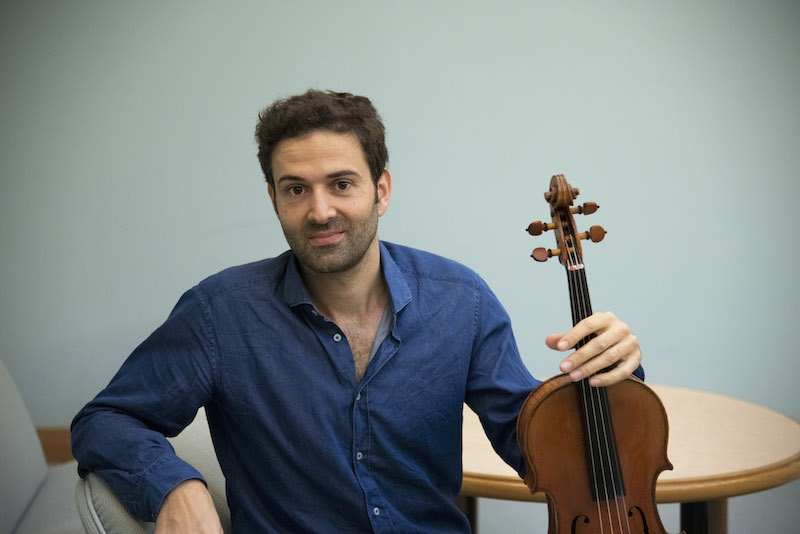 Tokyo, 2019 © Monika Ritterhaus
Tokyo, 2019 © Monika Ritterhaus
Is the Berlin Philharmonic one of the best orchestras in the world?
I believe so, yes. It’s a very democratic orchestra in which conflicts are rapidly settled in order to prioritise work. The Berlin Philharmonic is also extremely selective. It is the only orchestra in the world where the trial period lasts two years. In France for instance the trial period lasts approximatively three months with a maximum trial extending to one year. In the Berlin Philharmonic, the musicians spend a lot of time together. Especially in the practising rooms which are behind the orchestra pit. We practice together in various ensemble which allow us musically to get to know each other in a more profound way. We discuss, sometimes with vehemence, but this enables us to forge some kind of synaptic link with one another. When we meet again in the orchestra pit, it’s always the common interest that predominates.
The Berlin Philharmonic has the reputation, say some, to sustain a large number of egos, which could at times, transpire through the sound of the orchestra.
It’s true that we are surrounded by strong egos. But these egos don’t transpire the same way in a group. Having an ego isn’t necessarily bad in music. It has its function and can, if rightly used, be beneficent for the orchestra.
Do musicians need to get along to play well together?
One needs to play well to get along.
What are the qualifications of a good conductor?
A good conductor manages to create a state in which everything is used and aligned to serve the music. He manages to establish a vision and style which depends mainly on the way he reacts to the orchestra’s energy. A good conductor must be able to produce a state of concentration, a consciousness in which egos diminish under the demands of music. All forces must be used to support the sound. The conductor transcends or is transcended by music. I view a good conductor, literarily as a channel. If this channel suffers from a small tremor or a tension in his ankle for example, it will transpire through the music and influence the sound of the orchestra.
Can one therefore hear the conductor’s personality through the sound of the orchestra?
Good results don’t necessarily depend on the conductors’ personality but on the way he uses the music, or the way the music passes through him. And I don’t think this is necessarily only linked to one’s personality. There is more to it.
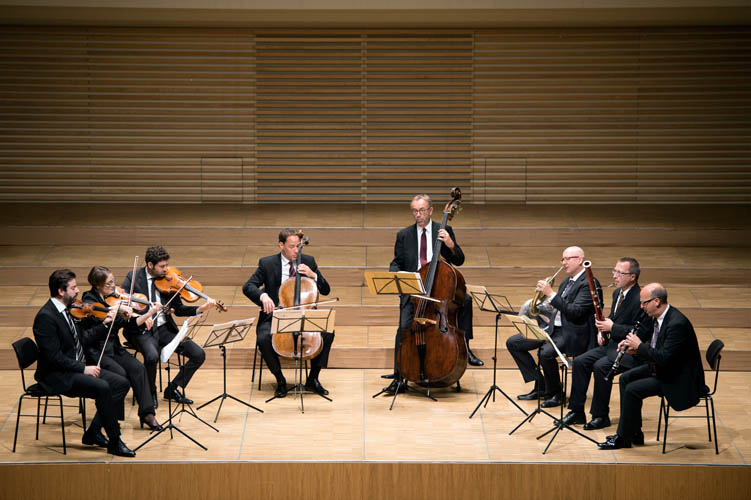 Scharoun ensemble, 2015, Micha Afkham, 3rd from left
Scharoun ensemble, 2015, Micha Afkham, 3rd from left
What happens when everything is aligned, when the music passes straight through you?
It’s the same image as with the conductor who canalizes and passes the music through himself. I’m taken by my game and I find myself in a state of pure concentration. What’s important is no longer who I am, who is there and what I’m doing. Only the music remains.
Does this happen regularly?
Oh no. This is very rare.
Are you transcended by music each time you play?
You can be in the music in the sense that you are producing it, you are active, but you aren’t necessarily transcended by it. It’s very rare that all the members of an orchestra simultaneously bow under the music and participate in the same energy.
Do you have any needs before entering stage? Praying, smoking, meditating, any obsessive compulsive disorders to be mentioned?
When I play in the orchestra I don’t have any particular ritual besides changing my clothing. I put on my frock and each time I tell myself damn it I forgot to wash my collar.
No one would notice though?
No, nobody sees it. Yet it disturbs me enormously. Otherwise, when I play solo, before entering stage I practice a type of mini respiratory yoga.
Any dreams you would like to accomplish in the future?
I feel more and more the need to transmit to others what I have learned. To teach.
What do you need to relax yourself?
I garden a lot. To be in contact with earth is an absolute necessity for me. Hence all the potatoes.
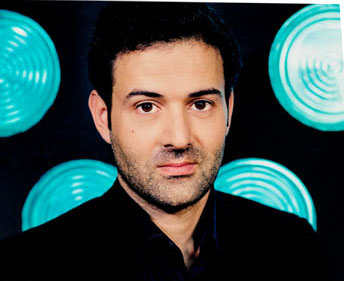 © Felix Broede, 2018
© Felix Broede, 2018
If you could reincarnate. You can choose the era, the country, the profession, a personality, legend, anything. What would you choose?
I was once told that I was, in a previous life, a prince without a country. A prince without a country who moreover had luxurious tastes. If I had another life, I'd like to come back as this prince, but this time with a country and a castle.
Let’s say you are a philanthropic billionaire and you are obliged to give away some of your money. To which cause would you give it?
I would forbid lobbies. I would do anything to destroy lobbies of all kinds. .
Do you have a favorite musician or one that particularly affects you today, or in the past?
I really like András Schiff. I find him very honest. I listened to him play the Goldberg variations in a recital in London. It made a very strong impression on me. I was shaken. In shock. Then for a year I listened over and over to the recording of his Goldberg variations but never did I manage to experience what I had during his recital.
Is Bach one of your favorite composers?
It’s true that Bach will always remain one of my biggest references. Schumann is also very dear to me because I’m directly touched by his language. I like his schizophrenia. With his two souls in one heart. Florestan and Eusebius.
***